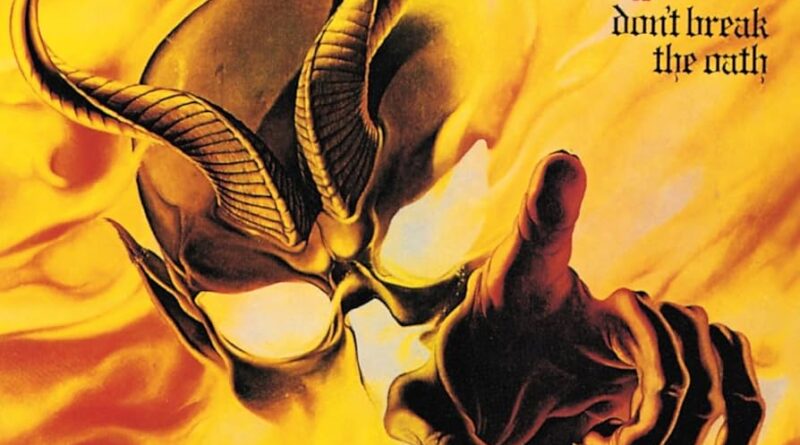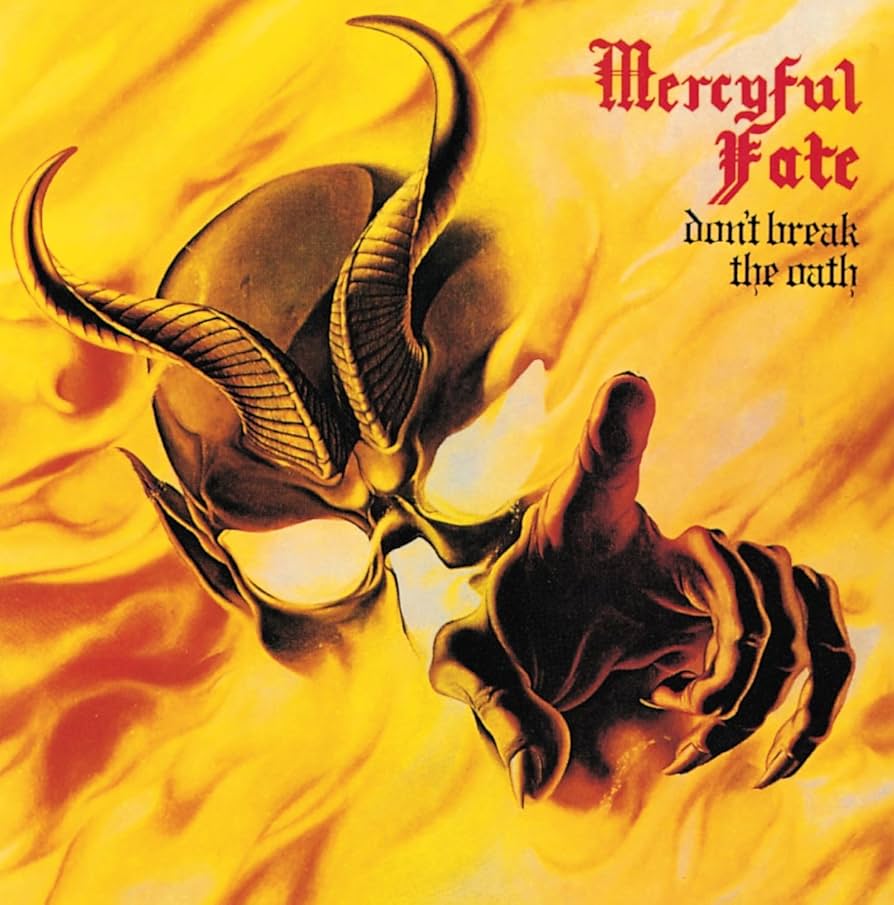
When MERCYFUL FATE entered Copenhagen’s Easy Sound Recording in May 1984, the cracks in the band were already starting to show. In the short time since their debut album Melissa hit shelves the year prior, the Danish quintet had garnered a bit of a reputation for themselves. Much of this centred around idiosyncratic frontman King Diamond, a philosophical Satanist with a penchant for the occult.
Diamond’s beliefs had shaped much of the band’s lyrical direction up to that point, carrying through to their live show in the form of on-stage rituals and spiritual invitations. “I’m not preaching Satanism,” King told Kerrang! in 1984. “But I want people to be aware of ‘The Powers’ because they might lead them to a better life.”
While Diamond may have been fully invested in the occult, his bandmates were less fervent believers. “King was more in charge of all that Satanic stuff,” guitarist Hank Shermann told The Metal Voice in 2016. “We were young guys, 25 years old, we didn’t seem that deep in to it.” Fellow axeman Michael Denner took it further when speaking to Bardo Methodology years later. “[King’s] interest in Satanism and ghosts and devils and ghouls and graveyards and shit got deeper and deeper while I was trying to avoid it.”
King Diamond’s occult infatuations may not have entirely been to the rest of the band’s taste, but they were willing enough to go along with it in the interest of creating great music. But those beliefs became a manifestation of a wider creative power struggle within the band between Diamond and the guitar duo of Shermann and Denner, the former of whom had been the lead musical contributor in the band to date. “King’s song-writing was quite different compared to Hank, and I always preferred Hank’s riffs,” Denner explained. “On ‘Melissa’, Hank and I said, ‘No, there should be no King Diamond song.’ He was able to include a few tracks on ‘Don’t Break The Oath’, but we weren’t too happy about it in the beginning.”
Overall, the band’s songwriting had become more ambitious, with the material on Don’t Break The Oath typically more sprawling and complex compared to its predecessor. Shermann contributions like the buzzsaw blade aggression of A Dangerous Meeting or the multi-suite momentum of Nightmare were monstrously riff-laden, while Diamond-penned tracks like The Oath and Come To The Sabbath were dramatic and unsettling. Creatively, the band were firing on all cylinders.
Functionally, much of the recording of Don’t Break The Oath mirrored the setup of Melissa. Working in the same studio and with the same producer, it was an opportunity to build on what had and hadn’t worked previously. In contrast to the Melissa sessions, the band were able to negotiate double the recording time – a luxurious twelve days. Additionally, MERCYFUL FATE put their foot down with producer Henrik Lund and were adamant on being involved in the mixing process. “He found out very quickly that it was beneficial for us to sit there and be able to say, ‘Hey, could you take that one up a little bit, let me hear that,’” Diamond told Your Last Rites. It was a more efficient process that helped bring the band’s vision to life more accurately, but it wasn’t all perfect – particularly for guitarist Denner. “I thought he got a bit closer with the guitar sound, but still I’ve never been happy with that aspect of the early albums.”
Recording complete, creative tensions would continue to rear their head as the band decided on a running order for the record. “It was very democratic,” Shermann told The Metal Voice. “Everyone wrote down on a piece of paper and then we would look at them and combine.” After fighting hard to get his own material on the album, it’s fair to say that King was disappointed with the voting results. “I know King, he really wanted to have ‘The Oath’ starting on Side A,” Shermann continues. “The rest of the band chose ‘A Dangerous Meeting,’ so King was a little upset about that…”
While the band’s creative differences had survived Don’t Break The Oath’s creation, it felt like the writing was on the wall for MERCYFUL FATE by the album’s release on 7 September 1984. Reception to the album itself was positive, but rife with caveats. In his review for Kerrang!, Malcolm Dome noted that the heavy Satanic overtones of the album would relegate the band’s appeal – after all, heavy metal and rock fans were actively trying to distance themselves from the moral panic of Satanism. Summing it up, Dome was suitably damning: “To stay with King would almost certainly doom the four instrumentalists under prevailing conditions to cult asphyxiation.”
The rift between members only grew bigger in Don’t Break The Oath’s wake. Following a tour to support the record, the band would split just over half a year after its release. Shermann, who wanted to move the band in a more commercial direction, almost immediately formed arena rock act FATE, whereas King started a solo career that initially saw him bring guitarist Michael Denner and bassist Timi Hansen in to his musical coven. Ironically enough, solo KING DIAMOND would at least see the frontman tone down the Satanic overtones in lieu of pursuing conceptual horror stories.
Between the album’s initial reception and all the band members moving almost immediately on to new projects, it was an abrupt end for MERCYFUL FATE. While Don’t Break The Oath was certainly a cult classic from the start, the years that followed gave the record time and space from its surrounding band drama. On its own merits, the record’s reputation became genre-defining, leaving its mark on everything from METALLICA to the entirety of black metal. Between Diamond’s shrieking banshee wails and the venomous guitar attack of Shermann and Denner, Don’t Break The Oath truly captured the band at their peak – wholly unstable, but eerily powerful all the same.

Don’t Break The Oath was originally released on September 7th, 1984 via Easy Sound Recording.

No comments:
Post a Comment